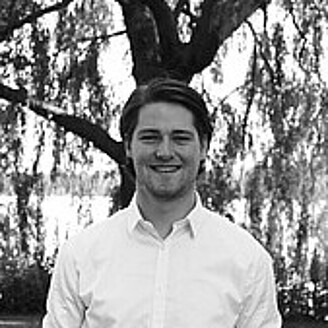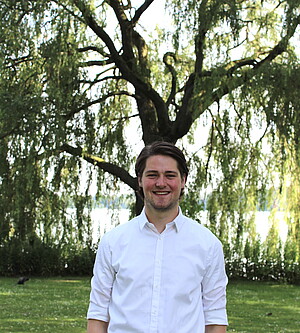If you start educating yourself more on problems in the world – where most of the SDGs are focused on – you’ll also really see they’re interconnected and that the complexity for solving them is very high
Quint van Stuivenberg

Master student Quint van Stuivenberg is on a mission to further improve education at RSM. Specifically, he looked to bring sustainability more to the forefront and joined the Positive Change team at the start of the academic year 2020-2021. Extremely dedicated, well-spoken, and a true critical thinker, Quint told us why he wanted to join the team and why it’s important to contribute to bettering the world.
Why should students be more involved in education?
“In my master programme, we learn that there are many areas affected by business, but this is not always covered in detail. To improve that, students must give feedback and speak up about what they find important. Professors are specialists in their area, but you can’t expect them to see and know everything from all sides. Also, with digitisation and globalisation of the world, things are changing quickly, perhaps even faster in places that are less developed. We need to learn and know about this. The pace of change isn’t going to get any slower so people, organisations and education must adapt to become future-proof.”
Do you see positive change much on campus or in the curriculum?
"Positive change really came into the picture in my second year in the bachelor, when we had the leadership, sustainability and governance course, the I WILL course, and extracurricular events. In particular events that questioned the system or challenged how we’ve been doing things in the past, for example the student debate with Anand Giridharadas. The more active I became on campus, the more examples of positive change I found. In my master, I already see a difference. In every course we have assignments in which we use the UN’s Sustainable Development Goals (SDGs) and explain how we apply them to what we’re creating.”
What’s your personal motivation for bettering the world?
“If you start educating yourself more on problems in the world – where most of the SDGs are focused on – you’ll also really see they’re interconnected and that the complexity for solving them is very high. It might scare you off at first, questioning whether changing your daily habits matters. But once you start doing it, you might see that it influences the environment around you, sometimes in unexpected ways. For me, it’s also the principle of, ‘if I don’t do it, then the person next to me won’t do it either.’
“Your career is a large part of your life, so if you use your knowledge and skills for a good purpose in your work, you can create an even bigger impact than only from your personal daily activities.”
What is your role in the SDG Dashboard Project?
“I’m guiding the team together with Joey Johannsen, RSM’s sustainability co-ordinator. We gave the team members the methodology that we work with and we’ve divided tasks. They are now collecting information about what specific topics they would like to work on and see where they want to get more knowledge and skills and help them achieve that. We also look at how they can reach their personal goals of development and education, not only the goals of the project.
“The whole team really likes the project. As a BIM student it’s interesting to see that the School sees the value of data information, and can also turn into valuable improvements. This project gives us a much greater overview of where these improvements can be made.”
What would you like to achieve?
“It would be amazing if the SDG Dashboard Project would reach these two goals:
-
to set a complete baseline this year so we can see where RSM stands for reaching the SDGs by 2030
-
spark managers’ motivation to devote some time to help tackle the SDGs that they might be overseeing.
And on a bigger scale, hopefully we can inspire other faculties and organisations to do the same.”
Do you have any advice to new students?
“Focus on extracurricular activities: it will give you the most of the learning experience and it’s what you remember in the end. You’ll likely remember those interactions more than textbooks will; it shapes you more as a person and makes you more aware of where and in what community you’d like to find yourself in or like to be a part of.”
Quint will likely pursue RSM’s Business Analytics Management as a second master programme, or opt to complete an internship to supplement his current studies.
